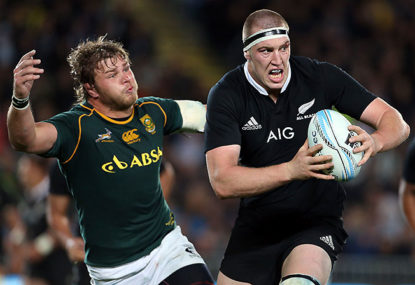Rugby Australia's debts blow out to almost $89 million after draw-down of PEP facility
Phil Waugh is hopeful that windfalls from the 2025 British & Irish Lions tour and the 2027 RWC will be more than enough to pay back the debt.

In the build-up to New Zealand’s historic Test match against the USA at Soldier Field in Chicago, I read an interview in The Telegraph with Brett Gosper, chief executive of the IRB.
In the article, the Australian stated he would welcome the “terrific” prospect of playing a Six Nations match in the US, broadening the appeal of rugby in the most competitive sporting marketplace in the world.
While most would dismiss this as fanciful headline grabbing, I am slightly worried that administrators could see it as a viable option. The trend of sending ‘home’ fixtures away is growing.
The concept of taking a home game away from home is not unusual. The NFL’s International Series at Wembley has been so successful that the NFL are talking of moving a franchise to London in 2022. The MLB also play away, opening their season in Sydney at the SCG as part of their commitment to the survival of baseball in Australia, and to grow their global brand.
In the super-competitive and crowded environment of Australian sport, it is fairly common to play home games in towns without a team of their own. The AFL plays matches in Tasmania, Cairns, and now internationally, in New Zealand on Anzac Day. NRL clubs also get in on the act, sending games to Cairns and out west to Perth.
International football teams, for a multitude of reasons, regularly play home friendly matches away. This particularly affects South American teams, as Tim Vickery points out in his excellent blog.
For example, only three of Brazil’s last 12 international friendlies have been played in Brazil. While often for logistical reasons, their recent match versus Argentina in Beijing was purely financial with total disregard for player welfare.
Taking games away from fans has even popped up on the radar of arguably the most recognisable and popular sports league in the world, the English Premier League. For the purposes of brand building, the Premier League already plays pre-season tournaments and matches to build their global brand.
But when chief executive Richard Scudamore proposed an international 39th game, there was widespread opposition. The Football Supporters Federation formed a petition against “Gam£39” opposing what they referred to as the “outrageous desecration of the national game” for financial gain.
That plan has been put on the back burner – for the moment – but the idea has never truly gone away. Scudamore said at the time, “if we didn’t do it, another sport would come and do it to us” highlighting his views on modern sports global reach.
International rugby has previously got in on the act, when the Bledisloe Cup was taken to Hong Kong and Tokyo in 2008 and 2009 respectively.
In European club rugby, Wasps and Harlequins played an LV= Cup match at a temporary stadium in Abu Dhabi in 2011. Wasps fans were so upset with the idea that the club were forced to compensate season ticket holders for the missed game, and organise a private open training session to further placate members.
Saracens have been trying to organise an overseas game since 2011, twice attempting to play Heineken Cup ties in Cape Town. Scuppered by local politics when due to play Biarritz, it was Edinburgh’s chief executive Craig Doherty who put the brakes on second time around, refreshingly citing a “commitment to our fans” as the principle reason.
London Irish boss Andy Martin has broached the possibility of playing a Premiership match in North America, potentially Boston.
Even Brisbane Premier Grade rugby union side Brothers RFC, based in Albion in Brisbane’s inner north, played their Round 15 Hospital Cup game versus Norths in Roma, 500 kilometres to the west, admirably taking rugby to the often ignored country towns.
The desire for sports to showcase and develop their brand is growing in importance, and is arguably becoming a financial necessity in an increasingly competitive marketplace. But playing more club and international matches away from loyal home fans weakens the brand integrity.
I am, first and foremost, a live sport fanatic. The atmosphere as teams battle it out in front of a passionate home crowd, who howl with both derision and unbridled joy, that is what sport is all about.
To that end I can’t reconcile a Six Nations match being played at anywhere else other than in Europe. The tournament is huge, ticket demand far outweighing supply and taking a match away from the fans would be a cruel insult.
I think it’s inevitable that club fans will be forced to miss out on the odd game some seasons. We live in a global world after all, and it would be impossible to halt the irrepressible march of sports teams transforming into businesses. But please don’t do so by affecting the spectacle and alienating the fans.